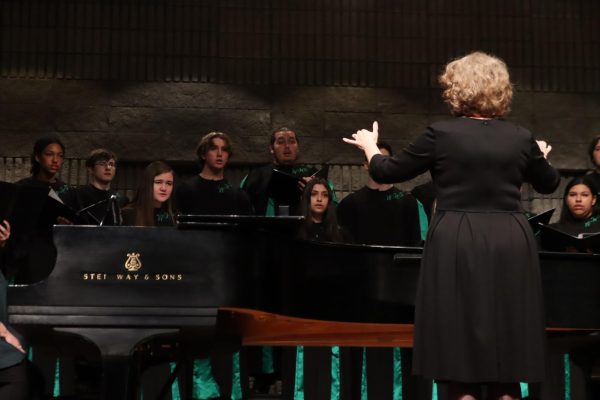Voters to consider $6 million no-tax increase bond for school
The Proposition S no-tax increase bond issue will help alleviate the financial struggle of the school district if taxpayers approve the measure on April 2, proponents say.
Safety, security and savings were the three main factors emphasized in Superintendent Dr. Shawn Poyser’s speech about Prop S during a community meeting on March 20 about the $6 million no-tax increase bond.
Poyser enumerated many of the benefits that could come from this no-tax bond. The money collected will be used towards improved air quality (HVAC modernization), roofing upgrades, fire alarms, entryway security upgrades, improved lighting, parking lot improvements, lease payments, and athletic field safety improvements. The main concern for the bond’s budget is leases.
“Most of these improvements will be made here [High School/Middle School campus] for two reasons, the first being that all of our kids end up here and because there’s more issues here than in North Elementary and South, comparably, considering size-wise and the number of students,” Poyser said.
Some of the money collected through the bond will go to pay down district debt. The district has $1.8 million in leases. This costs the district $288,000 a year out of the operating budget. The leases are for roofs and six busses.
Poyser compares the money spent on leases to that of grocery money. What could potentially go towards salaries, books, chromebooks, and utilities has instead been put towards leases.
The school district has a declining fund balance and declining enrollment with 200 fewer students than 10 years ago. Poyser said that translates to about $6,200 a student, which is $1.3 million in lost revenue. The school also has a $400,000 deficit.
“We cannot continue to run a budget deficit,” Poyser said. “Like, if you’re running your own personal account for a month, if you’re making $3,000 a month and spending $4,000, something’s got to give. That’s where we are right now.”
Other solutions to Warsaw school district’s financial situation have been and will continue to take place should the proposition not pass, such as closing Ruth Mercer Elementary and reducing staff, salary, student support and student services. Poyser is unsure as to whether the bond will impact the rates in which these factors may be reduced, because it may vary depending on the needs of the district next year.
Although student voice is very prominent in matters concerning the school, a very small portion of the student population is actually eligible to vote. Senior Robert Mcmurtry is pro Proposition S and will be voting on April 2.
“I would vote yes for Prop S because it won’t increase taxes, it will just keep them the same as what you pay now,” McMurtry said. “I think the school should be looking at other options, too, like combining all of the schools onto one campus. There are three elementary schools, and if the district combined into one campus there would be less cost on maintenance. I don’t think there’s any cons to the proposition, it really benefits both sides.”
Hawthorn district manager and Prop S supporter, Chuck Allcorn compared the bond to a loan and household income.
“If you take it to a personal level, to a family and a family budget, you’re keeping the same job, you’re getting the same money, and maybe you’re struggling to make payments and you’re struggling to maintain your home. By stretching that payment out, instead of getting into that period of making late payments, you’re able to make them on time. It’s kind of like you’re going to be putting money into the bank,” Allcorn said. “We are going to make them [the payments] on time. We going to be able to have a quality education, we’re going to save some money on lighting, therefore instead of struggling to make the lease, by maintaining a level income–a level budget– we can all breathe.”
Poyser explained to community members that a ‘general obligation bond issue’ is a debt of the school district that is payable from taxes against property within the school district.
“Each year, the district retires or pays off old debt from previous bond issues and our assessed value grows. As that happens, we are able to fund new debt from the existing 80 cent levy without increasing our tax rate,” Poyser said. “We have a $2.75 operating levy and an 80 cent debt service so that makes it $3.55. We’re not going to raise taxes, but if you look at what we’re paying compared to everybody else in the state, we’re very very cheap.”
Proposition S will be an extension of the previous bond set in place, which also went towards similar needs. Poyser made a point that, although $6 million dollars is the expected revenue from the bond, should natural disasters or fatalities hit Warsaw, the money will then be transferred to help the city and any local businesses impacted.
When running a bond, districts cannot spend money out of funds for advertising. Because of this, Poyser dedicated the beginning of his speech to introducing supporters, such as school board members Tracy Spry and Mike Schockmann, Ruth Mercer kindergarten teacher Amanda Payne, chamber director Mack Vorce, mayor Eddie Simons, Hawthorn district manager Chuck Alcorn, Eryn Kellner, Jennifer Porter, and State Farm insurance agent Suzie Brodersen. These members of the bond committee aren’t just campaigning for fun — they are doing what they believe could get the school out of its current $400,000 deficit.
Details of Proposition S can be seen on the school website (http://www.warsawk12.org/).

Ally Estes is a senior with a passion for the liberal arts. She currently attends Warsaw High but plans on attending Graceland University in Iowa,...






